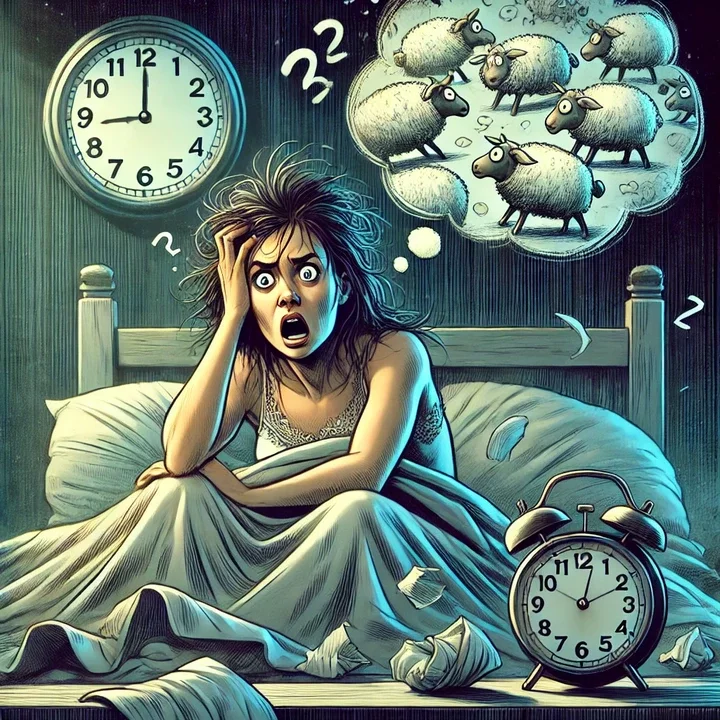
Insomnia is one of the most frustrating experiences a person can face. You're tired, you want to sleep, but your mind or body just won't cooperate. While an occasional sleepless night is common, persistent struggles with falling or staying asleep can take a toll on your physical and mental well-being. If you've been tossing and turning, here are some actionable strategies to help you get the rest you need.
Understand the Root Cause
Before you can address insomnia, it's essential to figure out what's keeping you awake. Common culprits include:
Stress and Anxiety: Racing thoughts and worries often keep people awake.
Poor Sleep Habits: Irregular sleep schedules, excessive screen time, or consuming caffeine late in the day can disrupt your sleep cycle.
Medical Issues: Conditions like sleep apnea, restless leg syndrome, or chronic pain can make it difficult to sleep.
Lifestyle Factors: Drinking alcohol, eating heavy meals before bed, or lack of physical activity can interfere with rest.
Identifying the cause helps you choose the right solution. If you're unsure, keeping a sleep diary for a week can help track patterns and triggers.
Create a Sleep-Friendly Environment
Your bedroom should be a sanctuary for sleep. Here are some steps to make it conducive to rest:
Keep It Cool and Dark: A temperature between 60-67°F (15-19°C) is ideal for most people. Use blackout curtains or an eye mask to block out light.
Minimize Noise: White noise machines, earplugs, or a fan can help drown out disruptive sounds.
Invest in Comfort: A supportive mattress and pillow can make a significant difference. Avoid synthetic materials that trap heat.
Limit Electronics: Remove TVs, laptops, and smartphones from the bedroom. The blue light emitted by screens can suppress melatonin production, a hormone essential for sleep.
Establish a Consistent Routine
A predictable bedtime routine signals to your body that it's time to wind down. Try the following:
Go to Bed and Wake Up at the Same Time: Consistency reinforces your circadian rhythm, even on weekends.
Relax Before Bed: Engage in calming activities like reading, gentle stretching, or meditating.
Limit Stimulants: Avoid caffeine, nicotine, and heavy meals at least 4-6 hours before bedtime.
Take a Warm Bath or Shower: This helps lower your body temperature, which can promote sleepiness.
Manage Stress and Anxiety
Sometimes, sleeplessness stems from a busy mind. Try these techniques to calm your thoughts:
Write It Down: If worries are keeping you awake, jot them down in a journal to revisit during the day.
Practice Mindfulness or Meditation: Apps like Calm or Headspace offer guided meditations specifically designed for better sleep.
Breathing Exercises: Techniques like the 4-7-8 method (inhale for 4 seconds, hold for 7, exhale for 8) can promote relaxation.
Seek Professional Help: If anxiety or stress is severe, consider therapy or counseling to develop coping strategies.
Natural Remedies and Supplements
If lifestyle changes aren't enough, natural remedies can sometimes help:
Melatonin: This over-the-counter supplement can regulate sleep cycles but should be used short-term.
Herbal Teas: Chamomile, valerian root, or lavender tea can have calming effects.
Magnesium: This mineral supports relaxation and muscle function. Foods like nuts, seeds, and leafy greens are excellent sources.
Aromatherapy: Essential oils like lavender or cedarwood can create a soothing atmosphere. Use a diffuser or spray your pillow lightly.

When Sleep Won't Come
Despite your best efforts, there will be nights when sleep remains elusive. Instead of forcing it, try these strategies:
Get Out of Bed: If you've been lying awake for more than 20 minutes, get up and engage in a quiet, relaxing activity. This might include reading a book under dim lighting, knitting, or listening to calming music. Avoid using your phone or computer, as the blue light from screens can hinder melatonin production.
Avoid Clock-Watching: Obsessing over the time can increase stress and make it even harder to fall asleep. Consider turning your clock away from view or using a clock-free method to wake up, such as a natural light alarm.
Engage in Progressive Muscle Relaxation: This technique involves tensing and relaxing different muscle groups, starting from your toes and moving upward. It can help reduce physical tension and calm the mind.
Visualize a Peaceful Scene: Close your eyes and picture a serene location, such as a quiet beach or a lush forest. Engage all your senses in the visualization-imagine the sound of waves, the scent of pine, or the warmth of the sun. This mental imagery can help shift your focus away from stressful thoughts.
Try a Sleep-Inducing Soundtrack: Many people find that ambient sounds, such as rain, ocean waves, or gentle wind, can lull them to sleep. Explore playlists designed for relaxation and sleep on music streaming platforms or apps.
Practice Breathing Exercises: Techniques like the 4-7-8 method or diaphragmatic breathing can help you relax. Focus on slow, deep breaths, which can lower your heart rate and prepare your body for sleep.
Limit Overthinking: If your mind is racing with worries, try jotting them down on paper to revisit during the day. This act of "mental offloading" can provide temporary relief and clear your head for rest.
Engage in Gentle Stretching or Yoga: Simple movements can help release tension from your body. Poses like Child's Pose, Cat-Cow, or Legs-Up-The-Wall can promote relaxation and reduce stress.
Use Aromatherapy: If you haven't already, consider adding soothing scents to your nighttime routine. Lavender, chamomile, and sandalwood essential oils are known for their calming properties.
Embrace the Power of Acceptance: Sometimes, the harder you try to sleep, the more elusive it becomes. Accepting that it's okay to have a restless night can reduce the pressure and anxiety surrounding sleep. Remember, even resting quietly in bed provides some level of restoration for your body.
By implementing these strategies, you can create a mindset and environment that fosters relaxation, even on the toughest nights. If sleeplessness becomes a recurring problem, it's crucial to address the root cause with professional help or lifestyle adjustments.
Avoid Long-Term Sleep Aids
While prescription or over-the-counter sleep aids can be effective for short-term relief, relying on them regularly is not a sustainable solution. Prolonged use can lead to tolerance, meaning you may need higher doses over time to achieve the same effect. This can increase the risk of dependency and potentially mask underlying issues causing your insomnia. Additionally, some sleep aids come with side effects such as grogginess, dizziness, or difficulty concentrating the next day. Instead of treating sleep as something to be "forced" with medication, focus on addressing the root causes of your sleep troubles through lifestyle changes, stress management, and improved sleep hygiene. If you do need to use sleep aids, consult a healthcare professional to ensure their use is safe and appropriate for your specific situation. Remember, the goal is to achieve natural, restful sleep without reliance on medication.
Know When to Seek Help
If insomnia persists for more than a few weeks or significantly affects your daily life, consult a healthcare professional. Sleep disorders often require specialized treatment, and addressing them early can prevent long-term consequences.
The Importance of Sleep Hygiene
Good sleep hygiene is the foundation for consistent rest. Here's a quick checklist:
| Stick to a sleep schedule | Nap for extended periods during the day |
| Create a relaxing bedtime ritual | Use screens right before bed |
| Exercise regularly | Consume caffeine or alcohol close to bedtime |
| Make your bedroom comfortable | Engage in stimulating activities late at night |
Final Thoughts
Sleep is a cornerstone of health, and while occasional insomnia is normal, chronic sleep issues require attention. By making changes to your environment, habits, and mindset, you can improve your chances of getting the rest you need. Remember, patience is key-your body may take time to adjust to new routines. If all else fails, don't hesitate to seek professional guidance. Sleep well!
















Comments